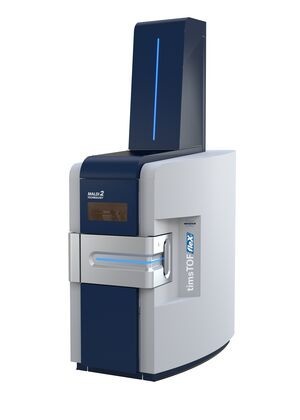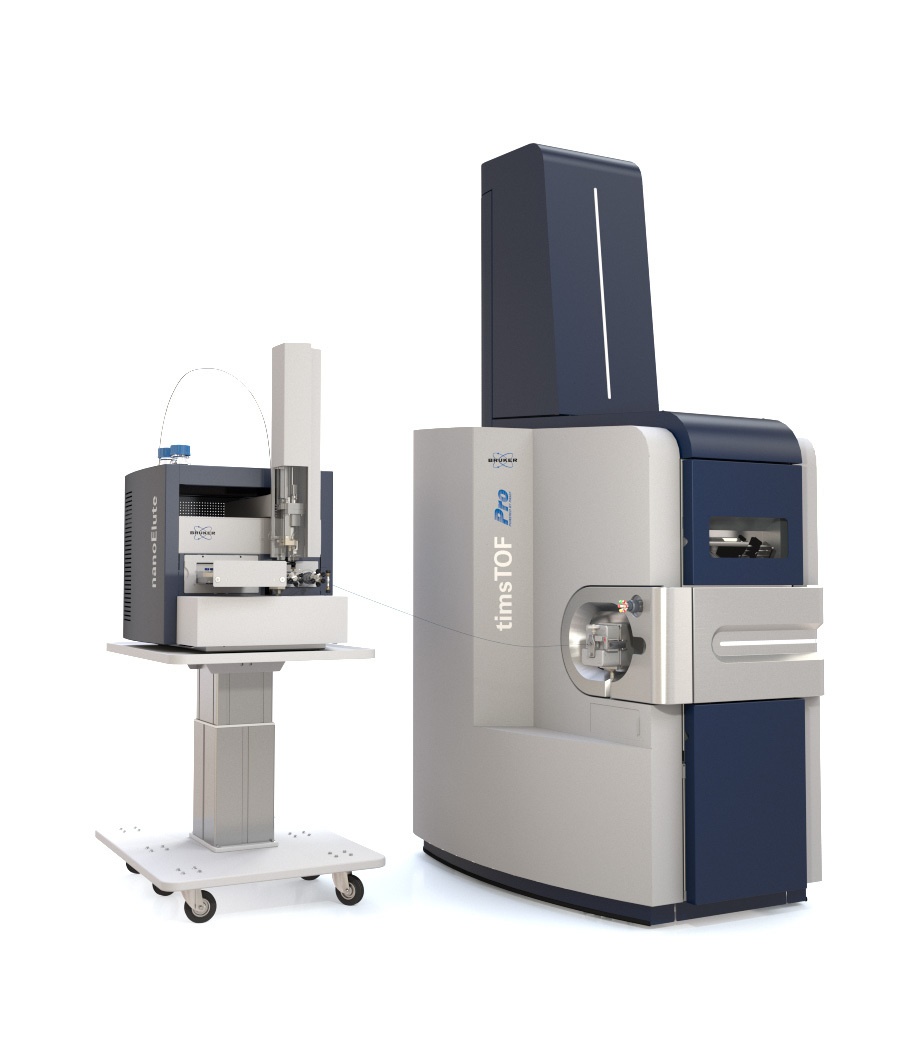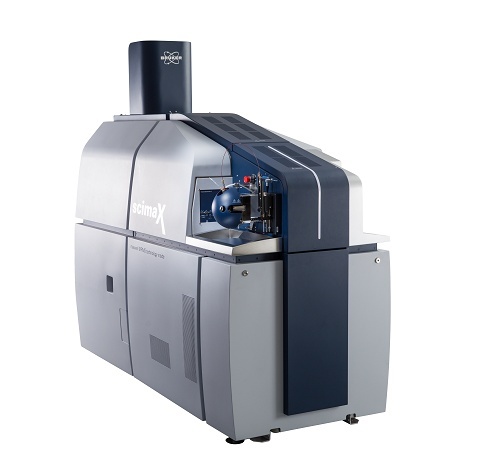參考價(jià)格
面議型號(hào)
品牌
產(chǎn)地
德國(guó)樣本
暫無(wú)看了布魯克timsTOF fleX組學(xué)和成像質(zhì)譜系統(tǒng)的用戶又看了
 留言詢價(jià)
留言詢價(jià)

虛擬號(hào)將在 180 秒后失效
使用微信掃碼撥號(hào)
布魯克于ASMS2019上推出高度創(chuàng)新的新型質(zhì)譜產(chǎn)品timsTOF fleX™質(zhì)譜儀,,包括適配于ESI timsTOF Pro™質(zhì)譜的軟件可切換的MALDI源,。這種新型ESI/MALDI組合功能,可在單臺(tái)質(zhì)譜上實(shí)現(xiàn)空間定位組學(xué)SpatialOMx™,。timsTOF fleX配備布魯克獨(dú)有的10 kHz SmartBeam™ 3D激光源,,具有真正的像素保真度,可在高空間分辨率下進(jìn)行快速,、無(wú)標(biāo)記的MALDI成像,,同時(shí)完全保持timsTOF Pro在ESI模式下****的4D蛋白質(zhì)組學(xué)和表型組學(xué)的靈敏度。
利用這種獨(dú)特的SpatialOMx方法,,研究人員可以深入洞悉MALDI成像組織中的空間分子分布,,從而指導(dǎo)4D組學(xué)分子表達(dá)研究,例如蛋白質(zhì),、低水平癌抗原肽,、脂質(zhì)、聚糖,、代謝物或那些用傳統(tǒng)染色或標(biāo)記技術(shù)無(wú)法觀察到的分子,。在MALDI指導(dǎo)下的SpatialOMx方法中,使用者可用隨后由ESI-TIMS/PASEF的dda(數(shù)據(jù)依賴采集),,或者dia(非數(shù)據(jù)依賴采集)4D蛋白質(zhì)組學(xué)或4D脂質(zhì)組學(xué)/代謝組學(xué)的數(shù)據(jù),,來(lái)開(kāi)展細(xì)胞亞群的特異性靶向研究。兩者現(xiàn)在都可以在同一臺(tái)強(qiáng)大的儀器上進(jìn)行,,即timsTOF fleX,,具有推進(jìn)單細(xì)胞生物學(xué)研究所需的超高靈敏度,成為用RNA測(cè)序(RNA-seq)進(jìn)行單細(xì)胞轉(zhuǎn)錄組學(xué)研究的**補(bǔ)充,。
The microenvironment of cancers contains a combination of healthy cells,, tumor cells, connective tissue,, blood vessels,, and inflammation in different ratios at different time points. Each of these components will have their own unique-molecular signature of compounds. Researchers who study disease states rely heavily on interpreting tissue pathology and creating these maps within the context of biomolecules bridges the gap between traditional OMICS and understanding disease.
Cancer cells and other disease states have significant genetic and epigenetic modifications that influence the genomic expression cascade. Whether you’re looking at the proteome, lipidome or metabolome,, the spatial distribution of compounds contains valuable Information for understanding your sample. If certain compounds are highly spatially concentrated or if molecules are co-distributed on specific structures,, this vital information is missing when only examining homogenized samples. OMICS based biomarker discovery can be limited without the benefit of spatial information to add important contextual clues as tissue-level communications networks are integral to cancer growth.
The timsTOF fleX is a versatile instrument for probing the molecular content of your sample. Built on Bruker’s pioneeringtimsTOF Proplatform,, the timsTOF fleX is a fully functional high speed, high sensitivity ESI instrument for all your X-Omics analyses,, combined with a high spatial resolution MALDI source and stage specifically designed for resolving molecular distributions and bringing a spatial dimension toOMICS analyses. Transform proteomics analysis into spatial proteomics,, lipidomics into spatial lipidomics, and metabolomics into spatial metabolomics.
Mapping complex molecular networks exposes intricate systems of interacting molecules within intracellular networks. Using SpatialOMx to create insightful atlases of communication mechanisms means learning more about the way cells communicate with each other to support change:
how cells interact with the local microenvironment to formulate promotion and mediation processes
how molecular networks of specific cells interact to perform specific biological functions
what effect epigenetic modifications have within these networks.
The timsTOF fleX – the flexibility to switch between spatial metabolomics,, spatial lipidomics or spatial proteomics with ease.
Match PASEF powered LC-MS/MS identification with label-free spatial localization to decode the molecular make up of your sample
Built on the standard for shotgun proteomics,, the timsTOF fleX combines best in class 4D X-Omics with Bruker’s cutting edge MALDI Imaging technology, including SmartBeam 3D laser optics for fast measurement all in one platform. A dual source instrument ideal for SpatialOMx,, timsTOF fleX conducts robust ESI measurements and spatially resolves a wide range of molecules directly from tissue using one platform. No single instrument has before provided access to both essential capabilities for the most advanced OMICS researchers.
SpatialOMx demands PASEF enabled LC-MS/MS for deep 4D OMICS combined with the ability to create molecular images of tissue sections with MALDI Imaging. To do this under one platform,, Bruker engineers started with the award winning TIMS dual-stage ion funnel and incorporated target stage and laser elements from the rapifleX axial TOF instrument. During operation,, software activation of the SmartBeam 3D laser is the only change in the source region. No complicated changeover means making zero compromises in productivity and the ability to move effortlessly from world class OMICS identification and quantification workflows to creating high definition molecular maps of tissue sections to see what matters most.
Since ions produced by MALDI and ESI travel the same path to the detector from the source, MALDI workflows can take advantage of the most advanced features found in the timsTOF Pro,, including TIMS ion mobility separation based on the collisional cross section of detected molecules and high-speed high-sensitivity PASEF fragmentation. Tuning and calibration can be performed in ESI mode and used for the MALDI experiment for additional ease of optimization.
MALDI Imaging is a label-free tool for examining the distribution of molecules directly from thin tissue sections. Applicable for examining a wide range of analytes,, including metabolites, lipids or glycans,, and seamlessly compatible with microscopy workflows,, MALDI Imaging can identify regionally specific compound distributions for SpatialOMx analyses. Use Bruker’s IntelliSlides for automated MALDI Imaging and SpatialOMx workflows on the timsTOF flex.
Besides the ability to generate high definition “True Pixel” MALDI images, the SmartBeam 3D laser source provides rock solid laser guided targeting down to 10 μM with Bruker’s new zoom mode technology. Users now have the flexibility to adjust their laser spot size and spacing to accommodate a wider range of granularity depending on biological features of interest.
Combining X-Omics performance with high MALDI sensitivity
Whether it’s proteomics,, lipidomics,, glycomics, or metabolomics,, the timsTOF fleX is the ideal platform for deep SpatialOMx analyses. Use patented SmartBeam™ 3D technology to conduct fast,, label-free MALDI Imaging for mapping the distribution of molecules in your sample and identify regions of interest for more specific analyses. ApplyPASEF powered LC-MS/MSfor the highest level of identifications and for greatest confidence in your results.
Combining the power of trapped ion mobility spectrometry (TIMS) andParallel Accumulation Serial Fragmentation (PASEF), the timsTOF fleX can deliver quantitative information from smaller amounts of highly complex mixtures. Using less than 200 ng sample load and a 90 min gradient length,, more than 5400 protein groups can be identified from a typical human cell line lysate. The high sensitivity reduces sample preparation costs and decreases time lost to maintenance.
With existing protocols for lipidomics,, metabolomics or glycomics, MALDI Imaging spectra can be used as a molecular fingerprint for specific regions,, or to investigate how compounds are localized across an entire sample for biomarker discovery. This can also be used for investigation of temporal changes, quantification,, and correlation of compounds to tissue states. The timsTOF fleX allows for fast high mass resolution MALDI imaging – with the SmartBeam 3D and specialized MALDI source and stage,, a high spatial resolution measurement of lipids from a rat brain section consisting of 370,000 pixels takes less than 5 hours.
Traditional workflows that sample small tissue sections (<100 μM) provide deep molecular details for a variety of chemical classes including RNA/DNA,, proteins,, glycans, lipids and metabolites. However,, processing times are long and tissue excise locations are determined with optical images that lack molecular signal information. SpatialOMx on the timsTOF fleX rapidly provides a high definition,, label-free overview that merges chemical information with vital morphological context. Choose your regions of interest manually or use SCiLS enabled automated segmentation to know exactly where your extraction will have the highest impact.
Using Bruker’s industry leading software,, it is now possible to annotate target molecules directly from tissue. Simply load your data into SCiLS Lab, define regions of interest,, and export the peak lists to MetaboScape. Annotate your peaks using databases or compound lists from LC-MS/MS analyses,, then review and export your annotations back to SCiLS for visualization. From SCiLS you can then visualize results with pathways and familiar nomenclature rather than mass labels to reduce the time from data to results.
南卡羅來(lái)納醫(yī)科大學(xué)蛋白質(zhì)組學(xué)中心主任Richard Drake教授表示:“使用新型timsTOF fleX系統(tǒng)運(yùn)行的樣本,其數(shù)據(jù)在空間分辨率和聚糖覆蓋深度方面是****的,。聚糖已成為組織和血清中潛在的臨床標(biāo)志物,,用以監(jiān)測(cè)身體的免疫狀態(tài),正?;蚍钦5乃ダ?,timsTOF fleX的獨(dú)特功能將大大加速該研究進(jìn)程。 timsTOF fleX使得我們可將為癌癥和免疫療法的組織和生物流體分析開(kāi)發(fā)的方法匯集在一個(gè)平臺(tái)上,。我可以看到這款儀器在許多研究領(lǐng)域中的無(wú)限應(yīng)用,,比如快速聚糖組織成像和生物流體4D組學(xué)分析?!?/span>
布魯克道爾頓執(zhí)行副總裁Rohan Thakur博士補(bǔ)充說(shuō):“大多數(shù)組織蛋白質(zhì)組學(xué)研究融合了來(lái)自不同亞群的細(xì)胞,,其不期望的平均效應(yīng)掩蓋了許多重要的生物學(xué)和病理生物學(xué)信息。在timsTOF fleX上,,MALDI引導(dǎo)的SpatialOMx方法能夠在空間上對(duì)指定的組織區(qū)域進(jìn)行分析,,從而允許隨后的4D蛋白質(zhì)組學(xué)選擇性地對(duì)細(xì)胞類型的亞群進(jìn)行靶向分析。功能強(qiáng)大,、具有超高靈敏度的timsTOF fleX,,在同一儀器上還提供nanoLC-TIMS-MS/MS,從而彌合了分子組織成像和體液分析間的鴻溝,。這種獨(dú)特的組合將使timsTOF fleX成為寶貴的研究工具,,用于空間分辨的4D蛋白質(zhì)組學(xué)和表型組學(xué),并推動(dòng)單細(xì)胞生物學(xué),、藥物蛋白質(zhì)組學(xué)和大細(xì)胞數(shù)量或患者隊(duì)列的轉(zhuǎn)化4D交叉組學(xué)的工作流程,。”
Helmholtz藥物研究所(HIPS)助理教授Daniel Krug博士評(píng)論說(shuō):“我們?cè)谒幬镅芯亢涂臻g代謝組學(xué)領(lǐng)域使用質(zhì)譜技術(shù),;尤其是分析新型天然產(chǎn)物的粘細(xì)菌次級(jí)代謝組,。我們實(shí)驗(yàn)室多年來(lái)一直使用布魯克的儀器和軟件,特別是SCiLS Lab和MetaboScape,;新分子成像工作流程集成了這兩種軟件解決方案,,極大地簡(jiǎn)化并加速了整個(gè)MALDI成像流程。該流程將離子圖像轉(zhuǎn)換為分子圖像,,并提高了注釋分子式的置信度,。”
暫無(wú)數(shù)據(jù),!
 布魯克timsTOF fleX組學(xué)和成像質(zhì)譜系統(tǒng)的工作原理介紹?
布魯克timsTOF fleX組學(xué)和成像質(zhì)譜系統(tǒng)的工作原理介紹? 布魯克timsTOF fleX組學(xué)和成像質(zhì)譜系統(tǒng)的使用方法,?
布魯克timsTOF fleX組學(xué)和成像質(zhì)譜系統(tǒng)的使用方法,? 布魯克timsTOF fleX組學(xué)和成像質(zhì)譜系統(tǒng)多少錢一臺(tái),?
布魯克timsTOF fleX組學(xué)和成像質(zhì)譜系統(tǒng)多少錢一臺(tái),? 布魯克timsTOF fleX組學(xué)和成像質(zhì)譜系統(tǒng)使用的注意事項(xiàng)
布魯克timsTOF fleX組學(xué)和成像質(zhì)譜系統(tǒng)使用的注意事項(xiàng) 布魯克timsTOF fleX組學(xué)和成像質(zhì)譜系統(tǒng)的說(shuō)明書有嗎?
布魯克timsTOF fleX組學(xué)和成像質(zhì)譜系統(tǒng)的說(shuō)明書有嗎? 布魯克timsTOF fleX組學(xué)和成像質(zhì)譜系統(tǒng)的操作規(guī)程有嗎,?
布魯克timsTOF fleX組學(xué)和成像質(zhì)譜系統(tǒng)的操作規(guī)程有嗎,? 布魯克timsTOF fleX組學(xué)和成像質(zhì)譜系統(tǒng)的報(bào)價(jià)含票含運(yùn)費(fèi)嗎,?
布魯克timsTOF fleX組學(xué)和成像質(zhì)譜系統(tǒng)的報(bào)價(jià)含票含運(yùn)費(fèi)嗎,? 布魯克timsTOF fleX組學(xué)和成像質(zhì)譜系統(tǒng)有現(xiàn)貨嗎?
布魯克timsTOF fleX組學(xué)和成像質(zhì)譜系統(tǒng)有現(xiàn)貨嗎? 布魯克timsTOF fleX組學(xué)和成像質(zhì)譜系統(tǒng)包安裝嗎,?
布魯克timsTOF fleX組學(xué)和成像質(zhì)譜系統(tǒng)包安裝嗎,?




